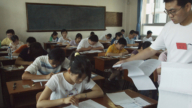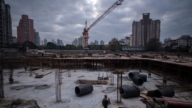【新唐人2011年11月11日訊】著名經濟學家郎咸平教授近日演講指出,中國製造業已陷入絕境。在APEC峰會召開之際,英國《金融時報》報導,北京當局研究人員建議允許匯率雙向波動及人民幣貶值。經濟學家指出,中國面臨製造業危機和歐美敦促人民幣升值的雙重壓力。
《金融時報》11月8號報導,中國國家信息中心首席經濟師范劍平說,中國外匯儲備繼續下降,9月份減少610億美元,證明存在著應當引發人民幣貶值的那種資本流出。
中國央行曾提出在人民幣交易中引入更多的雙向波動。范劍平建議「應當讓人民幣根據市場的要求進行調整」。
中共商務部長陳德銘在20國峰會期間說,從2005年中國匯改以來,人民幣兌美元已經升值了30%。中國的貿易順差在逐漸減少。
紐約城市大學經濟學教授陳志飛接受《新唐人》採訪表示,中國的製造業萎縮,導致人民幣面臨下行壓力。
陳志飛:「很多人都覺得人民幣應該貶值,這個實際是官方的一個普遍的聲音。因為現在中共內部從它的經濟發展來看,陷入了一個死結,因為現在發展的速度下來了,整個的製造業現在已經在萎縮。」
郎咸平教授10月22號在瀋陽演講表示,中國把製造業的定價權拱手讓與歐美等國,使得製造業的利潤大幅下挫,導致了06年第一次製造業危機。06年以後,地方政府的兩大錯誤政策,一是抓建設拉動GDP,二是瘋狂招商引資,造成了中國製造業的第二輪危機。
郎咸平:「到這個時候,你發現我們中國製造業的兩個危機統統出現:第一個,投資營商環境全線惡化;第二個,金融海嘯帶來的產能過剩。於是乎你從製造業拿出大量的錢不做了,這次呢跑去炒樓、炒股、買汽車、買奢侈品、買古董藝術品去了。」
郎咸平痛斥北京當局的三大錯誤政策,其中包括稅賦過重,五千年最高;錯誤的信貸政策導致企業資金鏈斷裂,中小企業出現倒閉潮,等等。
郎咸平:「在第一場定價權大戰失敗之後,加上三個政策的錯誤,我們傳統製造業的平均淨利潤率不到3%,09年下半年不到3%。這麼低的淨利潤率,我們能夠升值多少?那不夠3%吧?那美國要求多少?20%。」
自從去年6月20號人民幣重啟升值,至今人民幣兌美元升值已達8%。美國參議院10月2號通過了一項制裁中國操縱匯率的議案。而一些經濟學家辯稱,人民幣升值只會讓製造業轉移到其他低成本生產國。
溫家寶曾透露「中國的失業人口多達2億人」。
陳志飛:「人民幣升值應該是會導致中國失業率上升,它為甚麼希望人民幣要降值,主要也是為了保住就業率,避免更大的失業率。這其實恰恰表現了中國政府在經濟發展方面的不作為和它的腐敗,中國的外匯統制對民營企業的發展、對自己技術革新和增加就業人口是一個非常大的打擊。」
《金融時報》報導,中國國內支持人民幣加快升值的意見,主要是看到過大的貿易順差給中國經濟帶來的一些負面影響。他們認為貿易順差及其帶來的外匯佔款導致的貨幣超發,是中國通貨膨脹高企的重要原因。但是,《金融時報》認為這是錯誤的,誤判了貨幣發行與通貨膨脹之間的關係。
陳志飛:「它會加重通脹的壓力,但不會造成現在中共通脹失控這種局面。所以,很多體制內的人士、包括我們自己的人士這樣講是不對的,好像通貨膨脹是中國貿易發展、經濟發展必然帶來的,這不是的,這個其實是中共長期以來金融剝削的一個表現。」
卡內基國際和平研究院佩蒂斯教授9號警告,如果北京當局不抓緊讓出地方、省級乃至中央政府的一些利益,提高家庭消費在GDP中所佔的比重,中國難以在不出現社會動盪的情況下實現轉型。
新唐人記者常春、李元翰、薛莉採訪報導。
*****************
China』s Manufacturing Driven Into Last Ditch
In his recent speech, renowned economist Lang Xianping ,
stated, China』s manufacturing is driven into the last ditch.
APEC summit approaches and Financial Times reported
economists suggesting a system of two-way exchange rate of fluctuations and RMB devaluation.
Experts point out China is facing dual pressure about
manufacturing crisis and RMB appreciation from EU and US.
UK』s Financial Times reported on November 8 of a statement
of Fan Jianping, Chief Economist at State Information Center.
Fan said that China’s foreign exchange reserves continue
to decline at a reduction of RMB 61 billion in September alone.
Fan said that this proved the existence of a capital outflow
that would trigger a RMB devaluation.
Chinese Communist Party (CCP) Central Bank proposed to
introduce a system of two-way fluctuation in RMB trade.
Fan Jianping suggested, “RMB should be allowed to adjust
following market requirements."
At the G20 Summit, CCP Commerce Minister Chen Deming,
said that since 2005』s exchange rate reform, RMB has appreciated by 30% against the US dollar.
China’s trade surplus has gradually reduced.
Economics professor Chen Zhifei, at The City College
of New York, told NTD that the decline of China’s manufacturing caused RMB to
be under pressure.
Chen Zhifei: “A lot of people thought that RMB should be
devalued, this is actually a common view officially held.
China’s domestic economic development has been
caught in a deadlock.
With the current development slowdown,
the whole manufacturing sector has kept shrinking.”
In a speech in Shenyang on Oct 22, Prof. Lang Xianping said
China handed over the price setting power to Europe and US.
This resulted in the manufacturing industry’s profit falling
sharply, leading to the first manufacturing crisis in 2006.
Thereafter, CCP』s local authorities implemented
two erroneous polices:
1. Seeking GDP by promoting infrastructure constructions;
2. Massively inviting foreign business investments.
This caused China』s second round of manufacturing crisis.
Prof. Lang: “By this time, you could find that both two
manufacturing crises had a common phenomenon:
1. A full-scale worsening of investment environment;
2. Overcapacity caused by the global financial crisis
Vast capital was withdrawn from the manufacturing sector,
and invested in the property market for speculation, stock market, cars
and antiques."
Prof. Lang criticized CCP』s three erroneous policies of
heavy taxes, the highest in 5,000 years of China』 history;
erroneous credit policy, causing businesses』 cash flow crises,
and a tidal wave of medium to small-size business failures.
Lang Xianping: “After the first failure in the war of price
setting power came the three erroneous policies.
Thus in the second half of 2009 the average net profit margin
of our traditional manufacturing industries was less than 3%,. Such a low net profit margin.
How much did the RMB appreciate? Less than 3%, right?
Then how much did the US requests? 20 percent.”
Since June 20, 2010, when RMB restarted appreciation, the
exchange rate of RMB against USD was appreciated by 8%.
On October 2, the US Senate adopted a motion of sanctions
against CCP authorities』 currency manipulation.
However, some economists argued that RMB appreciation
would only enable manufacturing to move to other countries.
Wen Jiabao said, “China’s unemployment figure has
reached 200 million.”
Chen Zhifei: “RMB』s appreciation will cause a higher
unemployment rate in China.
Why does it want to depreciate RMB? Mainly to maintain
the employment rate, to avoid unemployment rising further.
That precisely reflects the CCP authorities』 non-constructive
actions and corruption of economic development.
China’s foreign exchange control on development of private
enterprises hit hard technology, innovation and employment.”
Financial Times reported China’s domestic views in support
of accelerating RMB』s appreciation.
Too large trade surplus has caused some negative
economic impact on China』s economy.
They believed that excessive currency issuing, caused by
trade surplus and outstanding foreign exchange funds, is important reason for China』s high inflation.
However, Financial Times thinks this is a wrong view, which
misjudges the link between currency issuing and inflation.
Chen Zhifei: “It can increase inflation pressure,
but can』t lead to the current situation of the inflation being out of CCP』 control .
So, such a point of view that is held by many people within
CCP, and even by people outside CCP, is not right.
It seems to justify that the inflation is an outcome, brought
by China’s trade development and economic development.
However, it』s not. Instead, it is a manifestation
of CCP』s long conducted financial exploitation."
Michael Pettis is a professor at Carnegie Endowment for
International Peace Research Institute.
He thinks Beijing authorities need to step up to the local,
provincial and even central government to improve the household consumption share of GDP.
Otherwise it would be difficult for China
to make a transformation without a major social unrest.
NTD reporters Chang Chun, Li Yuanhan and Xue Li






























